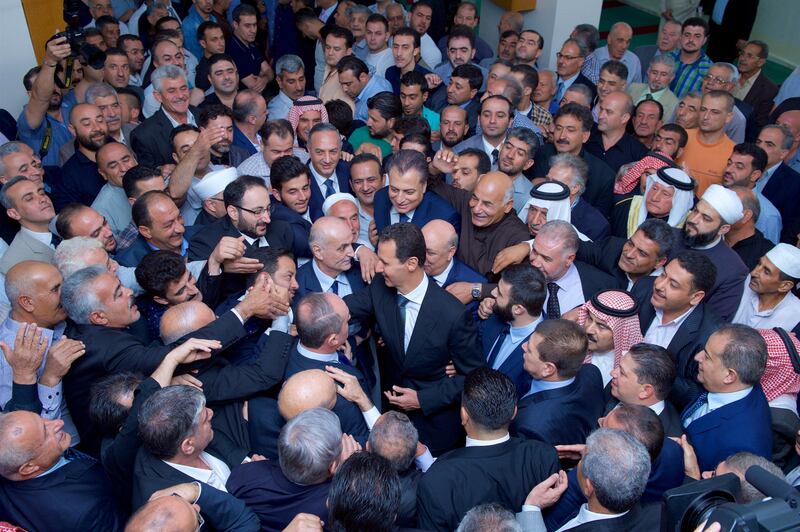France called on Friday for a political transition in Syria that would not include president Bashar Al Assad, after a series of shifting positions on resolving the six-year-old conflict.
"We cannot build peace with Assad," Foreign minister Jean-Yves Le Drian said on France's RTL radio.
"He cannot be the solution," said Mr Le Drian, who was defence minister in the former Socialist government.
"The solution is to establish a timeline for political transition that can lead to a new constitution and elections, and this transition cannot happen with Bashar Al Assad."
French president Emmanuel Macron said in July that the removal of the Syrian president was not a "prerequisite" for peace in the war-torn country, and that he did not see a "legitimate successor" to the leader who has been in power since 2000.
Paris had been a key supporter of the opposition to Mr Al Assad's rule since the start of the conflict in 2011 which has since killed more than 320,000 people and displaced millions.
But Mr Macron said that the fight against ISIL was a priority for France, which has endured a string of terror attacks that have killed more than 230 people since 2015, some planned in Syria.
On Friday, Mr Macron said he hoped to organise an international conference early next year in Beirut on facilitating the return of Syrian refugees, saying this was crucial for "stabilising Syria and the entire region".
Lebanon currently hosts more than 1.2 million Syrian refugees.
France's armed forces are in action as part of the US-led international coalition fighting ISIL in Syria and Iraq.
The group has lost much of the territory it controlled in the two countries, and thousands of its fighters have been killed since late 2014, when the coalition was formed to defeat the group.
Mr Le Drian said on Friday that ISIL "will be defeated in Syria," leaving the country with a "single conflict, that of the civil war" pitting an opposition against the Assad government.
Mr Macron has tasked his foreign minister with forming a new contact group on Syria to relaunch the stalled political process.
So far Paris has not been forthcoming on the composition of the group, notably on the question of whether regional power Iran — a key backer of the Syrian regime along with Russia - would take part.
UN Syria envoy Staffan de Mistura said last month that he hoped to launch "real, substantive" peace talks between the government and a still-to-be-formed unified Syrian opposition in October.
Mr De Mistura has hosted seven rounds of largely unsuccessful talks in Geneva, with Mr Al Assad's fate one of the main obstacles to progress.
Kazakhstan has hosted parallel talks, with a new round possible in mid-September.
Earlier peace talks in Astana saw Russia, Iran and Turkey - a backer of the rebels - hammer out a plan to establish safe zones across swathes of Syria. The zones do not include areas held by ISIL.
Mr Al Assad's regime has gained the upper against the rebels since Russia deployed its forces in Syria in late 2015. With the rebels in retreat, the Syrian army and allied forces turned their attention to ISIL and have retaken several areas held by the extremist militants. They are now advancing on ISIL's last strongholds in northern and eastern Syria, where the group is also under attack from US-backed Syrian militias.
In a sign of growing confidence, Mr Al Assad on Friday made a rare appearance outside Damascus to say Eid prayers in a town retaken from ISIL in the past week.
"President Assad prayed on Eid Al Adha in the town of Qara" in western Qalamoun, near Lebanon, the presidency tweeted, along with a picture of him kneeling in a mosque flanked by other officials.
Mr Al Assad has left the capital on only a few occasions since the civil war broke out, but this year he has been able to venture further afield more frequently, including to the central province of Hama and to western Syria, as his forces and their allies have scored victories on the battlefield.
ISIL fighters were forced out of the western Qalamoun area last week by pro-Assad forces including fighters from the Lebanese Shiite militia Hizbollah.
More than ISIL 300 fighters were allowed to leave the area with their families this week as part of a surrender deal but the convoy of buses carrying them to the ISIL-held town of Albu Kamal on the border with Iraq was prevented from going there by US air strikes along its route.
Iraq objected to the shifting of the fighters to its border as it enters the final stages of an operation to clear ISIL from its territory with the help of a US-led international coalition against the extremist group.





